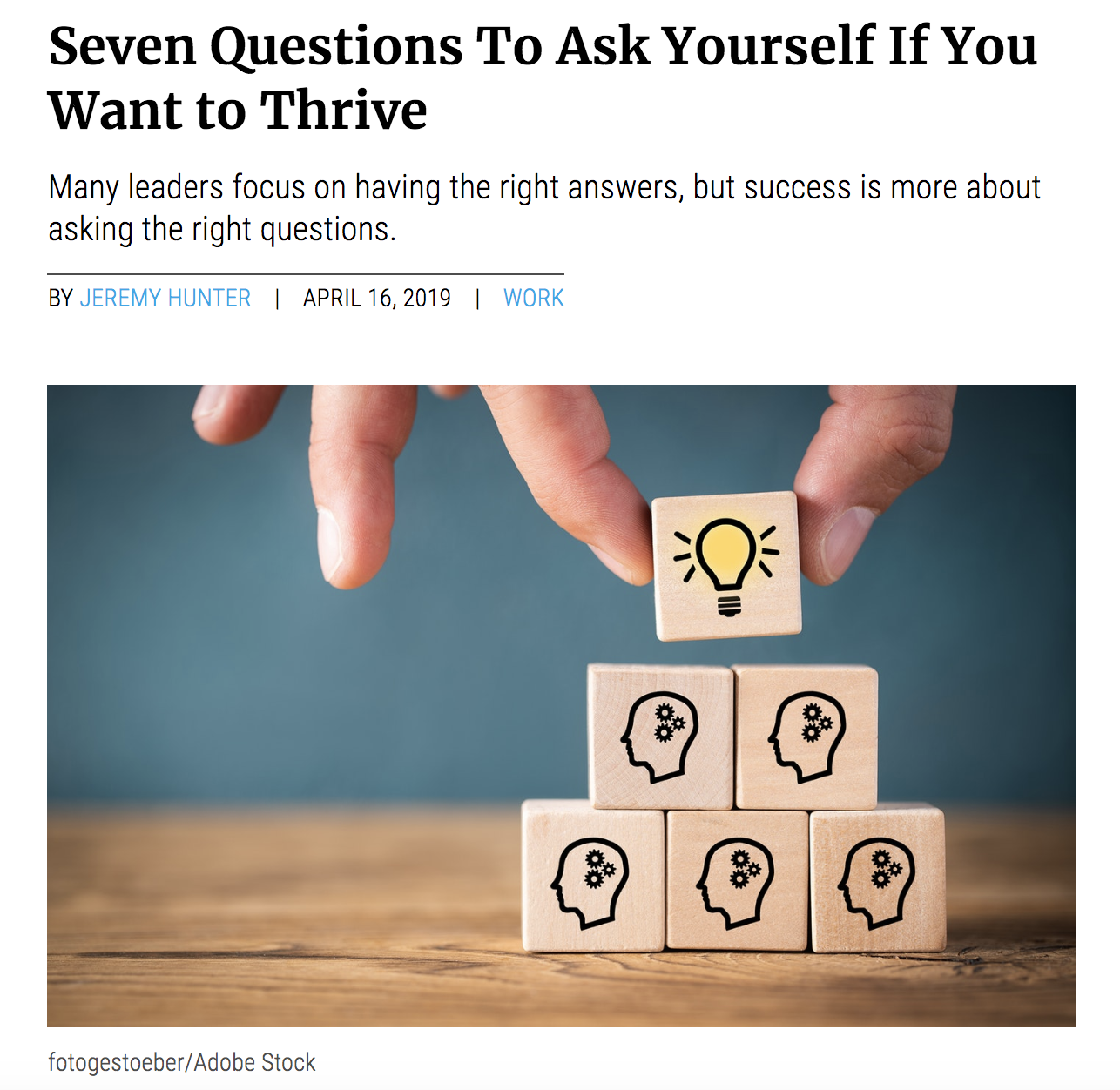
mindful.org記事 1/3:成功したいときに自分自身に問いかける「7つの質問」
ジェレミー・ハンターがmindful.orgに寄稿した記事を日本語訳にしてご紹介いたします。
mindful.orgオリジナルの記事(英語)はこちらからご覧いただけます。
本日より第3回に分けてご紹介していきます。
〜〜〜〜〜〜〜〜〜〜
Many leaders focus on having the right answers, but success is more about asking the right questions.
多くのリーダーは正しい答えを出すことにフォーカスしています。しかし、どちらかというと成功とは「正しい質問」をすることなのです。
The way we frame a situation can either open or shut down our ability to meet it effectively, creatively, and successfully.
Let’s try an experiment. Ask yourself the following questions:
状況の枠のはめ方によって、効果的に対応する能力を広げることもできるし、閉じることもできます。
ひとつ実験をしてみましょう。自分自身に以下の質問をしてみてください。
“How can I prove I’m right?”
どうやったら私が正しいと証明できるのだろう?
“How did I get stuck with these idiots?”
どうしてこのバカたちと一緒になったんだ?
“Who’s to blame here?”
これは誰のせい?
“How can I lose?” (…and what can I do to protect myself?)
どうしたら負ける?(そしてどうやって自分を守ることができる?)
What do you experience when you read these questions? What does your body feel like? Light? Heavy? Open? Constricted?
これらの質問を読んだとき、どんな体験がありますか?体はどのように反応していますか?
軽い?重い?オープン?締め付けられる?
What if you were on the receiving end of them? How might they affect your motivation level? Your emotional state? What actions are likely to result from these questions and what outcomes do you think they’d produce?
もし自分がこの質問を受ける側だったらどうでしょう?モチベーションレベルにどのように影響するでしょうか。
感情の状態には?これらの質問からどのような行動がうまれる可能性があり、それらがどのような結果を生むと思いますか?
Now try asking yourself these questions:
では次にこれらの質問をしてみてください。
“What’s working?”
何がうまくいってる?
“How do we move this forward?”
どうやって前に進んでいこう?
“What can we learn from this?”
これから何が学べる?
“How might we support one another for success?”
どうやってお互いの成功のためにサポートし合えるかな?
How do you experience these questions? Is there a difference when compared with the first set? Most people experience the first set as tight, defensive and demotivating.
これらの質問はどうでしたか?最初の質問と比べて、違いはありましたか?
多くの人は、最初の質問が厳しく防御的でやる気を失わせると感じています。
Furthermore, the first questions seem to be focused on one’s own needs and provoking an attack or at least actively disengaging. The likely outcome may be a stagnant or regressive one. In any case, they lead down a path of lost opportunity.
さらに最初の質問は、自分のニーズだけにフォーカスしていたり、攻撃を誘発したり、そもそもエンゲージしていないと言えます。予想される結果は、停滞して重苦しく、後退する可能性があるということです。
いずれにせよ、機会を失ってしまうのです。
By contrast, the second set seems more open, relaxed and engaging. Instead of ego-defense, they’re more focused on the situation at hand. Instead of provoking, they read as more likely to be productive and growth-oriented. Leaning in, they ask us to consider other possibilities. Instead of “I,” they are focused on “We.”
その反面、2つ目の質問群はもっとオープンで、リラックスしていて、さらに非常にエンゲージしています。自分を防衛するのではなく、もっと目の前の状況にフォーカスしています。イライラさせるよりも、生産的で成長志向です。他の可能性を考えるようになります。そして、「私」ではなく「私たち」にフォーカスします。
第2回につづく
